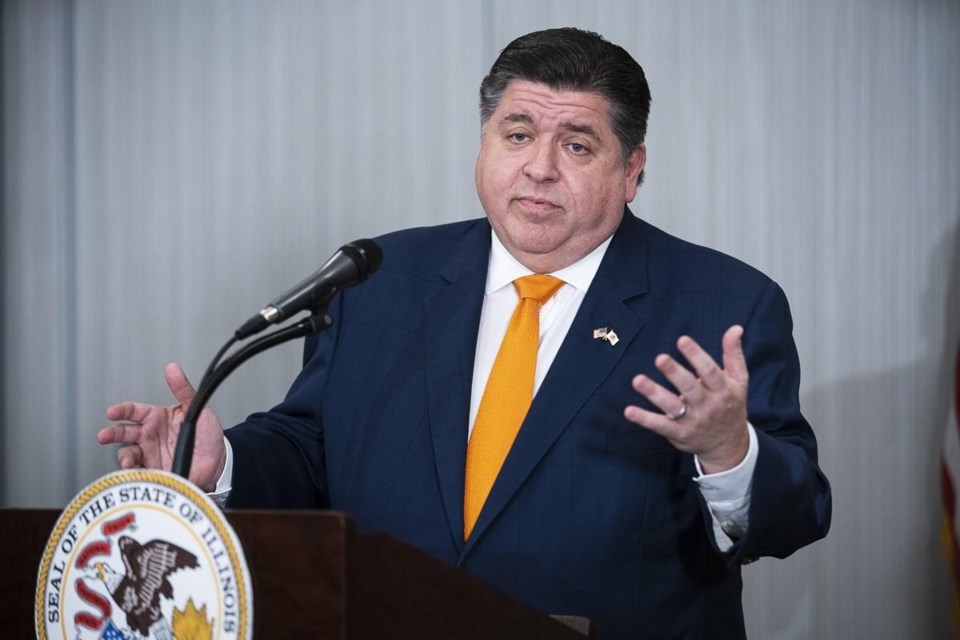SPRINGFIELD, Ill. (AP) — A mental health crisis among children in Illinois will be fought by streamlining and easing access to necessary treatment and coordination between six separate state agencies, Gov. J.B. Pritzker announced Friday.
In the works for nearly a year, the study examined the capacity and condition of Illinois’ response to behavioral health in young people. It sketches avenues to help families first to understand mental illness, then makes it easier for them to get required care without navigating what Pritzker called the “serpentine” paths of disparate state agencies.
“Government doesn’t work very well between silos of one department and another,” Pritzker said at a school in the Chicago suburb of Maywood. “People feel like they have territory that they need to protect. And the fact is that our territory is all of the children of the state of Illinois.”
The mental health of children nationwide rapidly unraveled during the COVID-19 pandemic. The Centers for Disease Control and Prevention in 2021 found 44% of American children had depressive episodes lasting at least two weeks and nearly half had thought about suicide, according to the report.
Lawmakers and advocates were impressed by the number of agencies working together.
“You think of a parent who’s in crisis at their wit’s end ... having to call each and every one of these agencies and trying to keep track of it,” said Senate Public Health Committee Chairperson Karina Villa, a West Chicago Democrat. “All they want is to get their baby the help that they need. Now we have a blueprint as to how they’re going to be able to do that.”
The report identifies technological, practical, legislative and other means for marshaling the expertise among the Departments of Human Services, Children and Family Services, Juvenile Justice, Healthcare and Family Services, Public Health and the State Board of Education.
The report’s authors were a team led by Dana Weiner, on loan from the Chapin Hall Center for Children at the University of Chicago, where she is senior policy fellow.
“What families (should) experience is a simplified, centralized, clear way to get access to services to understand what their children are struggling with and to identify the things that might help address those challenges,” Weiner said.
Friday’s announcement marks the beginning of work to ready the plan for implementation, a report on which Pritzker expects by October. There’s $22.8 million in the governor’s fiscal 2024 budget proposal to complete the planning.
The ranking Republican on the Senate Behavioral and Mental Health Committee, Terri Bryant of Murphysboro, said she's pleased a plan is underway, adding her main focus will be ensuring sufficient treatment space, particularly in southern Illinois where she lives.
Bryant said she was called recently to help find space for a 14-year-old boy from Arkansas who was violent toward the aunt who took custody of him. None was available and the boy was housed in a hospital emergency room for three weeks.
The report notes that 80,000 children under age 18 lives in areas of the state lacking necessary outlets. It identifies calculations that will be used to ensure equitable distribution of needed bed space.
Early awareness of mental health problems is critical too, Weiner said. The U.S. Surgeon General discovered in a 2021 study that on average, there is an 11-year gap between recognizing a child’s potential mental health issue and that child getting treatment. The report recommends widespread screening of young children which might telegraph future problems.
Like bed space, the report recognizes that worker shortages across industries will severely impact the mental health care program. It says the government must provide incentives, both in making education more attainable but also drawing upon paraprofessionals or aides to conduct critical work which doesn’t need extensive formal education.
Democratic Senate Majority Leader Kimberly Lightford of Maywood noted the planned outreach to help parents understand troubling signs which are often “overlooked or minimized by adults, believing that these struggles are something their child can overcome on their own.”
___
Follow AP Political Writer John O’Connor at https://twitter.com/apoconnor
John O'connor, The Associated Press



